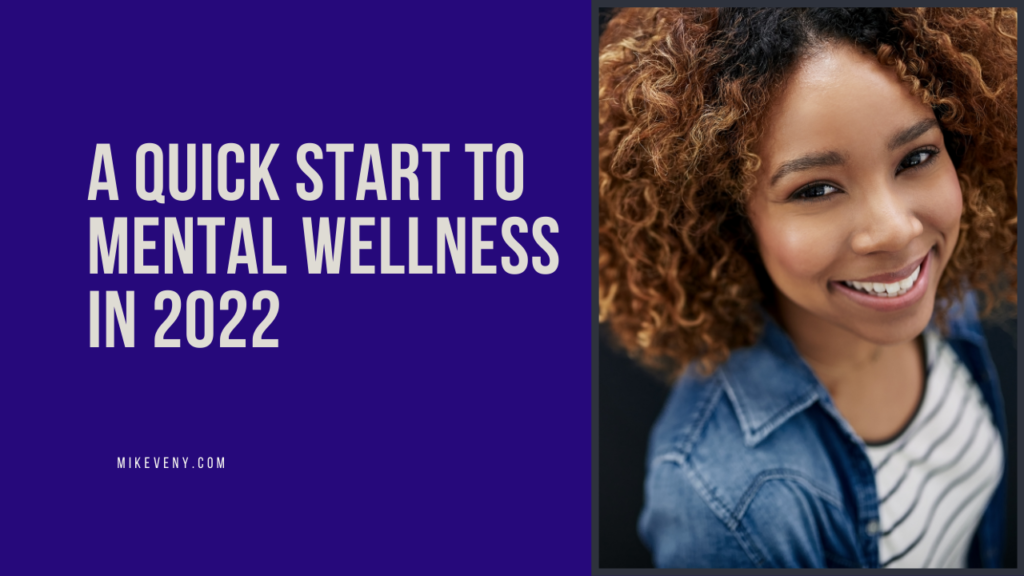
There was a massive shift in the messaging that took place at the start of 2022 around New Year’s resolutions—people didn’t want to set them. It makes sense. Over the last two years, we’ve experienced constant change and uncertainty, and for many, life has felt out of their control. With this in mind, many people opted out of resolutions and goal-setting for the year. If you’re in that place of feeling worn out and tired, I want to encourage you to be intentional about focusing on your mental wellness.
This can feel easier said than done when you’re overwhelmed and exhausted, so I’m going to share a Quick Start Guide to Mental Wellness to help make it easier for you.
Mental Wellness Quick Start Guide:
- What is mental wellness?
- Understanding the red flags of mental health and wellness
- Step 1: Evaluate where you are
- Step 2: Do a mind sweep
- Step 3: Determine what needs to go
- Step 4: Determine what habits & routines you can develop to help
- When is it time to get help?
What is mental wellness?
Part of the problem with learning to focus on our mental wellness is it’s an idea that isn’t well defined. If you ask several different people what it means, you’ll likely receive several different answers.
The Global Wellness Institute defines mental wellness as “an internal resource that helps us think, feel, connect, and function; it is an active process that helps us to build resilience, grow, and flourish.”
Mental wellness encompasses more than just self-care or whether or not we’re diagnosed with a mental health disorder.
It is our individual ability to cope with and manage stress and difficult situations. It’s our ability to feel, connect with, and express our emotions. It’s the way that we form relationships with other people. And it’s about our ability to process what’s happening around us in a healthy way and continue to move forward.
Our mental wellness plays a critical part in how we’re able to live our lives. When we are not mentally well, it can feel like everything is a struggle. Life can feel overwhelming even if the circumstances we are facing are minor. However, we can navigate even the complex parts of life that we face if we are mentally well and have the skills and strategies to cope with difficult situations.
Understanding the red flags of mental health and wellness
Now that we have a basic understanding of what mental wellness is and how it helps us in life, it’s essential to learn how to recognize the warning signs that we’re struggling with our mental health.
When we don’t know the signs, it’s easy to reason away the symptoms we’re experiencing, which stops us from getting the help we need.
Some of the common warning signs include:
- Not feeling happy when you’re doing something you know you used to enjoy
- Feeling empty or like you have no emotions at all
- Increased use/dependence on drugs or alcohol
- Crying easier than normal
- Thinking of hurting yourself or others
- Thinking your family, your friends, your workplace, or the world would be better off without you
- Engaging in self-harm behaviors like cutting
- Changes in your eating – both eating more and eating less
- Changes in your sleeping – both sleeping more and sleeping less
- Everything feels overwhelming and like too much to handle
- Difficulty making decisions
- Struggling to focus on anything and everything
- Worrying about things to the point that it interrupts your day
- Feeling like your situation is hopeless
- Increased strain in your relationships
It’s important to remember that you don’t have to have all the signs listed above to be struggling with your mental health and wellness. You may only notice a few of them. Or, you may not notice any of them, but a friend or family member has pointed it out to you. Overall, if you aren’t feeling like yourself lately, that alone can indicate that your mental health is struggling.
Step 1: Evaluate where you are
Back when I was in school, they taught us to call 9-1-1 if there was an emergency, the first thing they told us to do was look around and analyze the situation. If you see someone lying on the ground, you don’t want to just run right over to them. It’s important to give a quick scan to see what’s happening first because that will help you know what to do next.
We need to do the same thing for our mental health and emotional wellness.
Take time to evaluate the current state of your mental health. Reflect on and answer the following questions:
- How do I feel right now? Physically? Emotionally? Mentally?
- What is the current state of my most important relationships?
- How have I been feeling about my career and work life?
- Have there been any recent changes in my routine behaviors?
- How often do I take time for self-care activities?
Spend a few minutes sitting quietly. Take note of anything that comes to mind regarding the current state of your emotional wellness and/or mental health. It’s easy to become so busy in life that we don’t allow ourselves this time to connect with ourselves and observe what’s going on internally.
Step 2: Do a mind sweep
I’m a fan of the book Getting Things Done by David Allen. In the book, he suggests doing an activity called a Mind Sweep.
This is as simple as taking out paper and pen and writing down everything that’s on your mind. If you want, you can set a timer, or you can go until you feel you’ve emptied your head. You can write out worries you have, why you’re mad at your mom, things you need to buy at the grocery store, or that great idea you have for a business.
It doesn’t matter what it is; it goes down on the paper. So seeing all of these things on paper can help you identify things you can take action on to improve the state of your mental health.
Sometimes we think ignoring a problem is the easier way to go. However, it’s usually still rolling around in your brain and causing you stress. The better route to go is to face the reality of it head-on to start to see what action you need to take in that situation.
Step 3: Determine what needs to go from your life
When we take time to start confronting our mental health and emotional wellness, it helps us identify things, habits, behaviors, and even people that we need to eliminate or restrict in our lives.
Are you stressed about a lack of money? You may need to take the Amazon app off your phone and the credit cards out of your wallet.
Do you dread Mondays because you hate your job so much? It might be time to transition to a different company or career.
Do you feel anxious all day long about the state of the world? You may need to stop watching the news and take a break from media, including social media.
Do you regularly interact with someone who drains you of your energy with their negativity? It may be time to establish boundaries so you can protect your mental health.
When you start to identify the things that are negatively impacting your mental wellness, it helps you begin to identify the areas where you can make changes to help.
Step 4: Determine what positive habits & routines you can add to your life
When you’re trying to eliminate thoughts, habits, or behaviors from your life, it’s helpful to have a new positive one to use in its place. Now that we’ve taken time to identify the things we need to eliminate or restrict in our lives, it’s time to identify the new positive things we need more of in life.
If you want to change behaviors, identify the new behavior you will use to replace them. For example, maybe you want to stop drinking when you’re angry from a bad day at work. It helps to pre-plan what new activity you’re going to do in place of that, even if it’s as simple as choosing a non-alcoholic drink you will have instead.
If you’re used to binging on Netflix and you know it’s not helping your mental health and wellness, choose what activities you’re going to do instead. For example, maybe you limit your Netflix time to an hour so you have time to read a new book, go to the gym, or call a friend.
Resources to help
If you’ve struggled with self-care activities in the past, I have several resources that can help you create self-care routines for your life:
We have to be intentional about creating these new habits in our lives. Unfortunately, our brains want to default to what’s easy, which means it wants to continue to do what it’s used to doing. If you’re going to make a change, you have to teach your brain that you’re doing something different and then continue to do it until your brain knows that activity or behavior is the new default.
Making positive changes in our mental and emotional wellness is not usually easy, but it is always worth the effort.
When is it time to get help for your mental health and wellness?
If you walk away from reading this article remembering only one thing, I want it to be this: You don’t have to wait until you reach a certain point to reach out for help.
In society, there is this myth that you need to have a mental health disorder to get help from a mental health professional. Some people think they have to be “crazy” in order to benefit from working with a therapist.
The truth is anyone can benefit from working with a licensed therapist.
You don’t have to hit rock bottom before reaching out for help.
I encourage you to seek help as soon as you realize that you’re struggling instead of waiting for it to get worse.
If you think you might have broken your wrist, you aren’t going to wait months to see if it gets better on its own. You know that something isn’t right, even if you don’t know exactly what the problem is. It could be a sprain or a minor injury. Still, you won’t know unless you get help from a professional, and you won’t know how to treat it until you see what the problem is.
If you’re not feeling “right” or you’re experiencing some of the red flags in the list above, reach out to a licensed therapist to explore what’s going on. It doesn’t mean you have a mental health disorder or that you necessarily have a serious long-term problem. It simply means that you’re going through something too challenging to deal with on your own.
2022 is a great year to focus on mental wellness
You’re justified in feeling tired and overwhelmed. The past two years have been rough for many. And that’s not even considering the regular hurts, trauma, and difficult life circumstances that happen every year.
It’s easy to see why it would seem simpler to just let the year roll along without getting our hopes up about our situations improving. But that’s not a mindset where you want to stay. Your mental health and emotional wellness are so important, and I want to see all of you feel your best.
Use the simple activities in this Mental Wellness Quick Start Guide to get you started on the right path. If you need help along the way, don’t hesitate to reach out to a licensed professional.
Subscribe below if you want to receive monthly emails with quick tips and resources for your mental health and emotional wellness.


